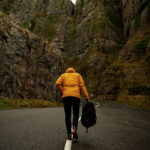What does it mean to practice solidarity, to become a neighbor, to exchange hospitality?
As a white, U.S. citizen engaged in immigrant justice work, my reflections on these difficult questions are constantly evolving. When I consider my intentions for walking from Tijuana to Los Angeles as an ally in the movement, my first thoughts jump to the consciousness-raising that must occur in my own privileged circles. I work at the San Luis Valley Immigrant Resource Center in rural southern Colorado, where community challenges include the inaccessibility of driver’s licenses, health care barriers, language access, domestic violence, and the inadequacy of legal options for undocumented people and their families.
These injustices will push me forward as we march for humane immigration policy. But the thing that most energizes me about El Camino is the relational aspect of walking, and the potential this holds for our collective healing as a transnational community. By walking alongside one another – in person or in spirit – we can learn to locate ourselves in relationship to each other’s lived experiences. 
Several years ago, I had the opportunity to practice this intentionality during a semester in Tucson, Arizona, through Earlham College’s phenomenal Border Studies Program. My experience included a field placement with No More Deaths, an organization that offers water, food, and medical assistance to people who traverse the remote Sonoran desert as a means of survival. Shortly before I joined other folks placing water jugs along those parched, cactus-studded mountains, I read a book called, The Death of Josseline, as required reading for my program. This journalistic account honors the life of Josseline Quinteros. Josseline was a 14-year-old Salvadoran girl who died in the Arizona desert in 2008, while en route to reunite with her mother in Los Angeles. She is one of thousands of migrants who have perished there since the escalation of U.S. border militarization in the mid-1990s.
The weight of this collective loss and trauma, filled the ravines and open spaces as I walked. One day, while visiting a migrant shrine built into a rocky alcove, I stumbled across a mundane fact that hit me in the gut. Josseline and I had shared a birthday: September 15, 1993. We were born on the same day, just a few countries apart, vulnerable like all babies, waiting for someone to nourish us with food, warmth, and love. But neither of us inherited a blank slate. Our lives would be shaped, in disparate ways, by the history of U.S.-sponsored violence in the Americas and the ugliness of white supremacy.
This is my truth: the white, English-speaking body that I inhabit has never felt the ache of forced separation, never been targeted as a foreign object when seeking welcome, never been compelled to walk or run long distances for any reason besides personal whim. When I was fourteen, a ninth grader, I already awaited college with great anticipation. Higher education was a given, and I knew my future would open up accordingly.
What kind of future did Josseline imagine for herself at age fourteen? What was her truth? We know, at least, that she walked because she imagined something better, a family that could be whole. Movement was integral to her reality, her dreams, her story. In the days that I advanced through school in a system designed for my success, the same sociopolitical forces pushed Josseline into the precarious position of crossing the desert and ended her movements with finality.
But, I believe that her memory, along with other spirits en El Camino, can move us into action if we pay attention to their presence in our communities. I often return to the unsettling ideas in Ghostly Matters, a book by the sociologist Avery Gordon. She suggests that we are continually haunted by shadowy figures who linger from injustices that are either systematically denied or supposed to be “over-and-done-with.” Unexpected signs from the realm of the ghostly call out for attention, challenging our complacency and disturbing us into action.
Josseline’s ghost startled me with the knowledge of our bound fates. As I continued dropping water in the desert that spring, more ghosts ventured into view. A child’s backpack, a stray sock, a hidden campfire ring still warm with coals. I replaced empty water jugs, and wondered who had tasted that water. Where did they come from, and where were they going? What did they envision for themselves and for our world?
El camino del inmigrante embodies a millennia-old tradition, a way of life. When I walk in solidarity, I want to feel the energy of everyone who walked before me and of those who continue the journey today and tomorrow. If we honor those stories, perhaps we can find roots in each other and fuse our collective energy into that enduring movement.
Elsa Goossen is a Mennonite volunteer living in Alamosa, Colorado, and working as an immigrant advocate at the San Luis Valley Immigrant Resource Center.



